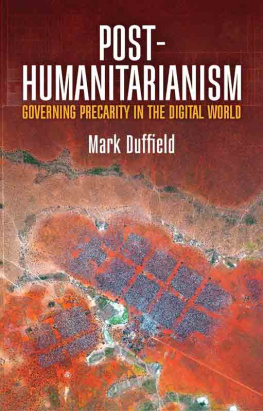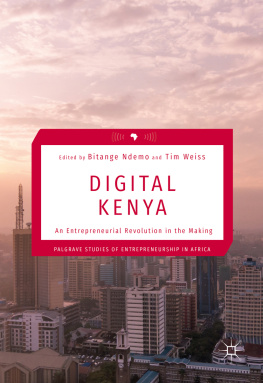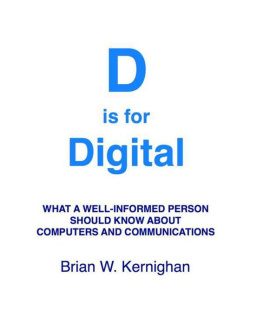
Copyright page
Copyright Mark Duffield 2019
The right of Mark Duffield to be identified as Author of this Work has been asserted in accordance with the UK Copyright, Designs and Patents Act 1988.
First published in 2019 by Polity Press
Polity Press
65 Bridge Street
Cambridge CB2 1UR, UK
Polity Press
101 Station Landing
Suite 300
Medford, MA 02155, USA
All rights reserved. Except for the quotation of short passages for the purpose of criticism and review, no part of this publication may be reproduced, stored in a retrieval system or transmitted, in any form or by any means, electronic, mechanical, photocopying, recording or otherwise, without the prior permission of the publisher.
ISBN-13: 978-0-7456-9858-8
ISBN-13: 978-0-7456-9859-5 (pb)
A catalogue record for this book is available from the British Library.
Library of Congress Cataloging-in-Publication Data
Names: Duffield, Mark R., author.
Title: Post-humanitarianism : governing precarity in the digital world / Mark Duffield.
Description: Medford, MA : Polity, 2018. | Includes bibliographical references and index.
Identifiers: LCCN 2018010023 (print) | LCCN 2018025557 (ebook) | ISBN 9780745698625 (Epub) | ISBN 9780745698588 (hardback) | ISBN 9780745698595 (pbk.)
Subjects: LCSH: Humanitarian intervention--Developing countries. | Humanitarianism. | Technology--Social aspects--Developing countries. | Developing countries--Social conditions--21st century. | Developing countries--Economic conditions--21st century.
Classification: LCC JZ6369 (ebook) | LCC JZ6369 .D84 2018 (print) | DDC 341.584091724--dc23
LC record available at https://lccn.loc.gov/2018010023
Typeset in 10.5 on 12pt Sabon by
Fakenham Prepress Solutions, Fakenham, Norfolk NR21 8NL
Printed and bound in the United Kingdom by Clays Ltd, Elcograph S.p.A.
The publisher has used its best endeavours to ensure that the URLs for external websites referred to in this book are correct and active at the time of going to press. However, the publisher has no responsibility for the websites and can make no guarantee that a site will remain live or that the content is or will remain appropriate.
Every effort has been made to trace all copyright holders, but if any have been inadvertently overlooked the publisher will be pleased to include any necessary credits in any subsequent reprint or edition.
For further information on Polity, visit our website: politybooks.com
Dedication
For
Elliott & Rupert
A luta continua
PREFACE
In the summer of 2012, I made a chance discovery, from which this book has grown. An internet search focusing on humanitarian work in Sudan returned some unexpected results. Since 2003, the UN had been working with a number of geospatial research institutes on the feasibility of using high-resolution satellite imagery to help the emergency response in Darfur. Apart from mapping refugee camps, this included remotely finding water sources so that new camps could be located nearby. Particularly striking, however, was the development of algorithms able to estimate the varying size of these settlements almost as they changed, without the need to go there. Moreover, advocacy groups were already using satellite imagery in the usually dangerous work of documenting sites of possible human rights abuse, by identifying things like burnt buildings or disturbed ground safely from the air.
Having visited Sudan many times for work and research purposes, this remote sensing was new to me. For a while, the discovery conveyed an excitement akin to having stumbled into a parallel scientific universe. Reflecting the widespread belief among humanitarian agencies that aid work had become more dangerous, my research at the time focused on the growing retreat of international aid workers into fortified aid compounds and gated-complexes. Given this withdrawal, the significance of remote sensing was immediately apparent that is, the potential of being able to understand and act from a distance without the need to be entangled on the ground. This ability is the central theme of Post-Humanitarianism: Governing Precarity in the Digital World. It explores a double movement, whereby a loss is also a gain. What is given up is the textured familiarity that disappears with remoteness. What is gained are the new visualization techniques, smart sense-making tools and novel governmental possibilities resulting from the digital recoupment of distance.
This discovery sparked a sustained period of enquiry, deepening interest and growing concern around the issue of remoteness and recoupment. There is more to becoming distant in order to get closer, so to speak, than meets the eye. Darfur quickly proved to be a small demonstration of that much wider event known as the computational turn that is, from the mid-1990s, the rapid spread of computers, mobile devices, software platforms and social media into all aspects of personal, public and international life, without exception. Moreover, as the retreat of aid workers suggests, this veritable electronic globalization gathered momentum at the same time as the world was being seen as more unpredictable and dangerous than before. For most people, the two are unconnected. Indeed, given the often-claimed growth in political complexity and uncertainty, the new sense-making tools appear fortuitous. Sceptical of such coincidences, Post-Humanitarianism is more open to their formative interleaving and interdependence.
The ideas of remoteness and recoupment beg the question of what has been lost, and what exactly has been gained? The computational turn has fundamentally changed our understanding of the world and what it means to be human. Together with a loss of familiarity, a growing reliance on machine-thinking means that reason, human agency and being present in the world no longer occupy the valued place they once did. For much of the twentieth century, human behaviour was measured against the often untrustworthy, but rational, decision-maker Homo economicus. Displacing this once familiar liberal avatar, a new behavioural yardstick has appeared. Compared to the confident Homo economicus, this new figure is unsure of itself. Cognitively challenged by the speed and complexity of contemporary life, it relies more on automatic and unconscious sense-making mechanisms rather than on conscious rational thought. This post-human avatar struggles to take in more than the immediate givens of its environment and accessible networks. The pages of this book are haunted by this overwhelmed, distracted and necessarily ignorant subject that, for want of a better term, is here dubbed Homo inscius. While challenged by a complex and uncertain world, Homo inscius is comfortable with its own inner vulnerabilities and human limitations, and its consequent dependence on the compensatory attentiveness that smart technology affords.
Rather than accept this rather unappealing subject as the guide to our purported post-human future, this book has sought perspective through a return to the materiality of capitalism. As an object of study and critique, capitalism has been long neglected within the academy. The computational turn is an intrinsic part of the transition from the mass production of Fordism to the personal consumption of todays new economy where Homo inscius is its ideal customer and pampered savant.
Next page










